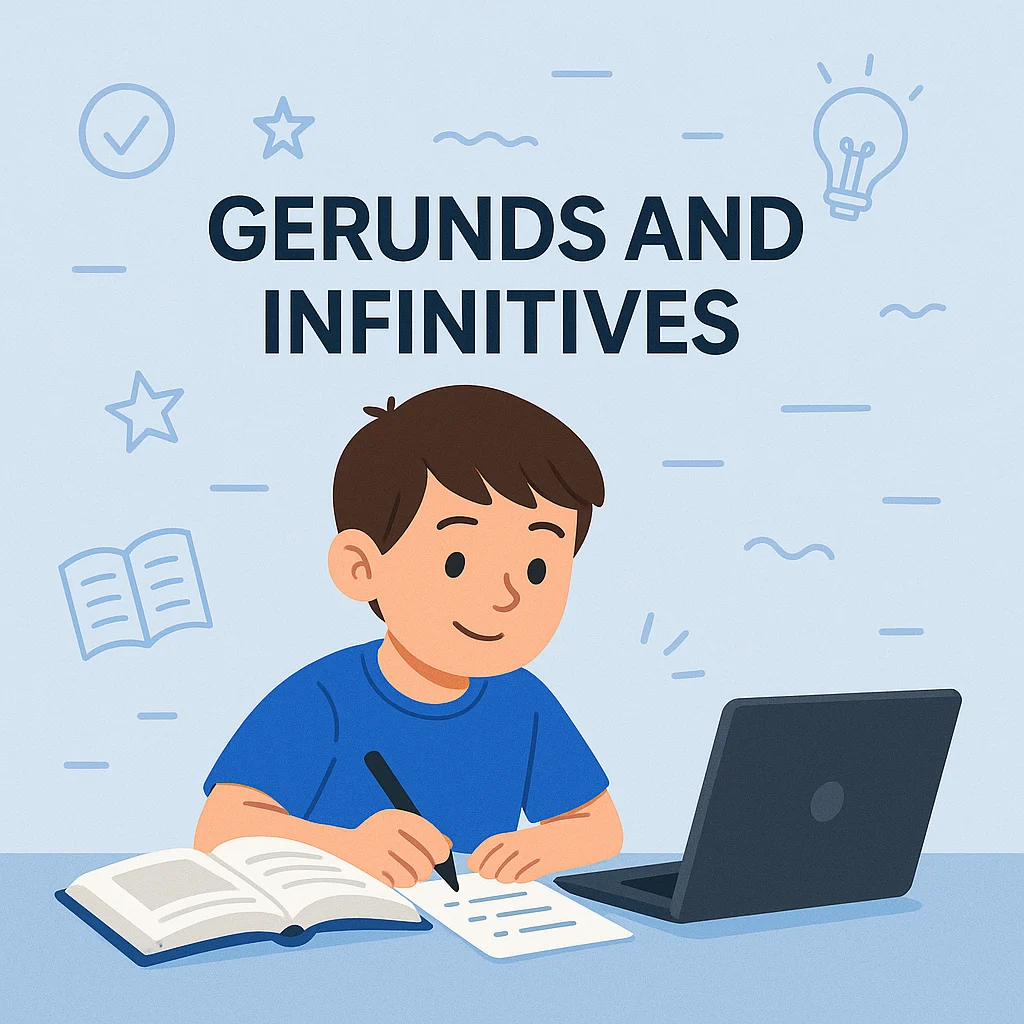Gerunds and Infinitives – Grammar| Exercise, Examples, Practice Test
Select Your Practice Test- Choose Your Difficult Level
Easy – Class 6 & Class 7 – Intermediate – Class 7 & Class 8 & Class 9 – HARD – Class 10 , CLASS 11- 12
MCQ Test, Self Assessment
| Chapter | Test Type |
|---|---|
| Easy | |
| Intermediate | |
| Hard |
🔍 What Are Gerunds and Infinitives?
✅ Gerund
A gerund is the -ing form of a verb that functions as a noun in a sentence.
Example:
🔹 Swimming is a great exercise.
🔹 She enjoys reading novels.
✅ Infinitive
An infinitive is the base form of a verb usually preceded by “to”, and it can act as a noun, adjective, or adverb.
Example:
🔹 He wants to swim.
🔹 They decided to leave early.
🧠 Key Differences Between Gerunds and Infinitives
| Feature | Gerund (-ing form) | Infinitive (to + base verb) |
|---|---|---|
| Acts as | Noun | Noun, Adjective, or Adverb |
| Used after | Some verbs, prepositions | Some verbs, adjectives, pronouns |
| Example | I enjoy painting. | I want to paint. |
📌 Usage Rules with Examples
🔸 1. Gerunds as Subjects or Objects
| Structure | Example |
|---|---|
| Subject = Gerund | Reading is fun. |
| Object = Gerund | I enjoy playing chess. |
🔸 2. Infinitives After Certain Verbs
Verbs followed by infinitives: want, decide, hope, promise, need, agree, plan, refuse
Examples:
🔹 She wants to learn French.
🔹 They agreed to help us.
🔸 3. Verbs Followed Only by Gerunds
Common verbs that take only gerunds:
enjoy, avoid, admit, suggest, consider, miss, finish, deny, risk
Examples:
🔹 He avoided answering the question.
🔹 She enjoys dancing.
🔸 4. Verbs Followed by Gerund OR Infinitive (with a change in meaning)
| Verb | Gerund Meaning | Infinitive Meaning |
|---|---|---|
| remember | Recall a past action | Not forget to do in the future |
| stop | Quit doing something | Pause to do something else |
| try | Do as an experiment | Attempt to do something hard |
Examples:
🔹 I remember locking the door. (past memory)
🔹 Remember to lock the door. (future action)
🛑 Common Mistakes to Avoid
| Incorrect | Correct | Reason |
|---|---|---|
| I enjoy to swim. | I enjoy swimming. | “enjoy” takes a gerund |
| She suggested me to join. | She suggested joining. | “suggest” is not followed by “to” |
| He wants going there. | He wants to go there. | “want” takes an infinitive |
🧪 Practice Exercises (Mixed Types)
🔹 A. Fill in the Blanks (Gerund or Infinitive)
- She promised _______ (help) me with the work.
- I can’t imagine _______ (live) in a noisy city.
- We decided _______ (leave) early.
- He avoided _______ (talk) to them.
- The teacher expects us _______ (submit) the assignment on time.
🔹 B. Identify the Error and Correct It
- He suggested to meet at 5 p.m. → __________
- I look forward to meet you. → __________
- She agreed helping me. → __________
🔹 C. Multiple Choice (Choose the Correct Option)
- I want _______ the guitar.
(a) playing (b) play (c) to play (d) played - _______ a second language takes time.
(a) Learn (b) To learn (c) Learning (d) Learns
✅ Answer Key
- to help
- living
- to leave
- talking
- to submit
- Error: to meet → Correct: meeting
- meet → meeting
- helping → to help
- (c) to play
- (c) Learning
🧱 Gerunds vs Infinitives: Quick Reference Table
| Verb | Gerund Only | Infinitive Only | Both (Different Meaning) |
|---|---|---|---|
| enjoy, avoid | ✅ | ❌ | ❌ |
| want, hope, decide | ❌ | ✅ | ❌ |
| stop, remember | ✅ | ✅ | ✅ |
🧠 Extra Challenge – Convert the Sentences
Original: She stopped to talk to him.
Change to gerund: ________________________
Answer: She stopped talking to him.
📚 Final Tip
- Use gerunds when the verb is the subject/object of the sentence, or after prepositions.
- Use infinitives to express purpose, future actions, or after specific verbs like want, need, hope.



Hi! Someone in my Facebook group shared this website with us so I came to take a look. I’m definitely loving the information. I’m bookmarking and will be tweeting this to my followers! Great blog and superb design.